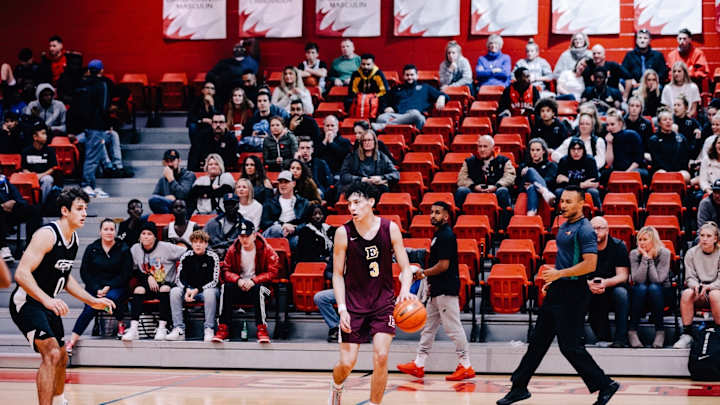Alan Spoonhunter: A look at basketball in Canadian Indigenous communities

Basketball wasn’t the obvious choice for Alan Spoonhunter.
Growing up an Indigenous boy in Lethbridge, Alberta, hockey was king in Spoonhunter’s community. He used to play at the local rinks with his friends, dreaming of one day taking the ice in the NHL. Access to hockey was easy. There were rinks and role models in the older boys he could look up to.
Back then, basketball was the opposite. Few others played basketball, and even fewer did so with any provincial or national recognition. It wasn’t until Spoonhunter was nine years old, when he moved with his father to the United States, that he started taking basketball seriously. He’d watch his father, Alan Spoonhunter Sr., coach a local team and he began to fall in love with the sport.
If not for his father and that move south, the 6-foot-5 Spoonhunter says he wouldn’t be where he is today. He wouldn’t be among Canada’s top high school basketball players, on the precipice of playing collegiate basketball next year. Instead, he, like so many other Indigenous children across Canada, probably would have given up on basketball, lacking adequate access to the sport and unable to see role models succeeding at the next level.
Spoonhunter’s story is one of overcoming barriers to success in the sport. When he moved back to Saskatoon to live with his mother, Spoonhunter said he used to walk over three hours to meet up with friends at local courts.
Eventually, when he realized he wanted to pursue basketball at a higher level, he said he faced discrimination because of the style of his play and his background. Coaches would prohibit him from playing on their teams or criticize him for the way he played, trying to change him to fit what they saw as the proper way to play the sport.
“It’s like a lot of people try to own you,” he said. “They feel like you’re a pet almost. They want to decide how you think.”
Spoonhunter’s experience playing basketball in Canada mirrors that of thousands of Indigenous children across the country.
Michael Linklater, 37, said he faced the same sort of prejudices growing up in Saskatoon because of the “rezball” style of basketball he grew up playing. He said his style mirrors that of street ball players, a sort of “Rucker Park” style, and some coaches wouldn’t bother trying to work with him.
“I do feel like I was discriminated against based on my play,” said Linklater, a former Canadian Elite Basketball League player with the Saskatchewan Rattlers. “That style of play was attributed to the neighborhood that I grew up in and the socio-economics for that neighborhood.”
Then, there’s the other side of the spectrum, out on the West Coast where Indigenous basketball has flourished thanks to high-quality coaching and gym access.
For 31-year-old Jacob Thom, of Prince Rupert, B.C., basketball was the easy choice growing up. His community was basketball obsessed and he grew up watching his older peers play in Prince Rupert’s annual All Native Basketball Tournament.
“When you’re just a young kid, you just kind of aspire to be in an environment like that,” he said of the All Native Basketball Tournament. “When you're watching those games, you can be like okay when I grew up, I want to play like that I want to do that.”
Growing up he had access to local indoor courts and more importantly great, welcoming coaches and Indigenous role models.
“I was a struggling youth,” Thom said. “I don't think I had a lot of self-efficacy; I didn't have a lot of value. So initially the coaches that coached my high school team really put a lot of time in. That was probably the biggest thing for me.”
He said he struggled with his Indigenous identity. At home, his grandparents who raised him didn’t like talking about their background because of the trauma his grandmother had endured at residential schools. For him, that trauma was passed down generationally and it wasn’t until Thom began to discover his basketball talent that his mindset changed, and he found self-worth.
Today, Thom is a basketball coach in Nanaimo, B.C., where he’s trying to inspire another generation of children to pursue basketball and instill the kind of values his coaches instilled in him. For him, it’s always been about great coaching and access, and he believes the future of Indigenous basketball comes down to ensuring adequate support is directed toward high-quality Indigenous coaches.
After that, Linklater said it’s important to ensure Indigenous children are made to feel comfortable playing basketball. He wants to see Canada Basketball create camps exclusively for Indigenous children, where basketball players can try out for higher level teams without feeling like outsiders.
With the proper support and a reconciliation of past traumas, stories of success in Indigenous communities throughout the country like Alan Spoonhunter’s won’t be so rare.

Aaron Rose is a Toronto-based reporter covering the Toronto Raptors since 2020. Previously, Aaron worked for the Eau Claire Leader-Telegram.
Follow AaronBenRose